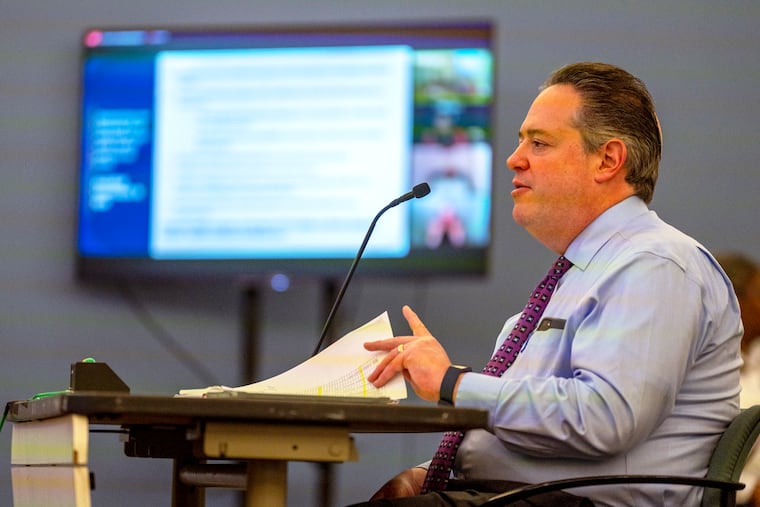Philly schools’ head of finance is named Shapiro’s budget secretary, a big loss for the district
Uri Monson’s elevation to the commonwealth’s top finance job is a blow for the school system, where Monson has worked for nearly seven years.

Uri Monson, the longtime Philadelphia School District chief financial officer, will become Pennsylvania’s next budget secretary, Gov.-elect Josh Shapiro announced Tuesday.
Monson’s elevation to the commonwealth’s top finance job is a blow for the school system, where Monson has worked for nearly seven years. Superintendent Tony B. Watlington Sr. had just promoted him to deputy superintendent, overseeing operations and finance.
“I’m a career government person,” Monson said in an interview. “It’s another challenge, but I’ve worked with the governor-elect before, I know him and share a lot of values with him about helping people, moving Pennsylvania forward. He builds good teams to do good work, and I’ve experienced that, and I’m excited to be a part of that.”
Monson earned widespread kudos during his district tenure for his fiscal stewardship, skill, and steady hand. When he took over the CFO job, the district’s finances were on shaky ground, in large part because the school system has no control over its own finances and must look largely to Harrisburg and City Hall for revenue.
Under his watch, the district was able to emerge from 17 years of state control. Its credit rating also climbed out of junk-bond status for the first time since the 1970s, allowing the district to save tens of millions of dollars in interest charges.
The announcement means a big hole for the school system, which has a budget of $4 billion. It’s on decent financial footing now but is projecting a five-year deficit and must confront the need to fix or replace many of its old 200-plus school buildings.
Watlington, in a statement, said he was “so appreciative” of Monson’s service as a “valuable leader.”
“He is a great colleague and friend, and I am looking forward to working with him in his new role as secretary of the budget,” the superintendent said.
Monson has close ties to Shapiro, who was chair of the Montgomery County Commissioners when Monson was Montgomery County’s top financial official. (Monson also served as executive director of the Pennsylvania Intergovernmental Cooperation Authority, the organization charged with reviewing Philadelphia’s budget to ensure financial stability.)
The two have known each other for 35 years.
Shapiro hailed Monson as “one of the sharpest minds in Pennsylvania” in a statement, saying he has led the district “into an unparalleled period of fiscal stability and he was instrumental in turning around Montgomery County’s finances as my CFO when we kept taxes low and grew our economy.”
Along with announcing Monson as budget secretary, Shapiro also named Jennifer Selber, his current executive deputy attorney general in charge of the office’s criminal division, as general counsel, and his campaign manager, Dana Fritz, as chief of staff.
Shapiro will be sworn in as governor Jan. 17; Monson said he will remain at the district through sometime in early January.
Given Monson’s history with Shapiro, it was no shock to most government insiders that he was tapped for the job. In fact, when Watlington met Monson over the summer, he told him: “I hear you might be leaving.”
Monson said he’s guided by a Jewish axiom: “It is not your duty to finish the work, but neither are you at liberty to neglect it.” So while much remains to be done in the school system, he’s also proud of what’s been accomplished during his tenure.
Stabilizing the budget was the highlight, certainly, Monson said, but he’s also proud of a move toward making district budget data transparent and digestible. Early on, peers in other cities were incredulous that Monson insisted on putting out five-year budget projections: He was in charge when the district first announced in 2017 it would face a $1 billion budget deficit in five years.
“It wasn’t for shock value, it was to show the truth of where we were,” Monson said. “The worst thing you can do is yo-yo investments for kids. It’s a 13-year time frame with these kids, and we have to think about how we maintain investment over time.”
Having a balanced budget isn’t the district’s mission, Monson said, but having a balanced budget allows it to get to its core mission: educating students. And though he’s headed to one of the state’s top jobs, the position he’s leaving will stick with him.
“I can’t imagine any other job that will ever have an ultimate issue as important as this one was,” Monson said. “It’s one of the greatest missions you can have.”